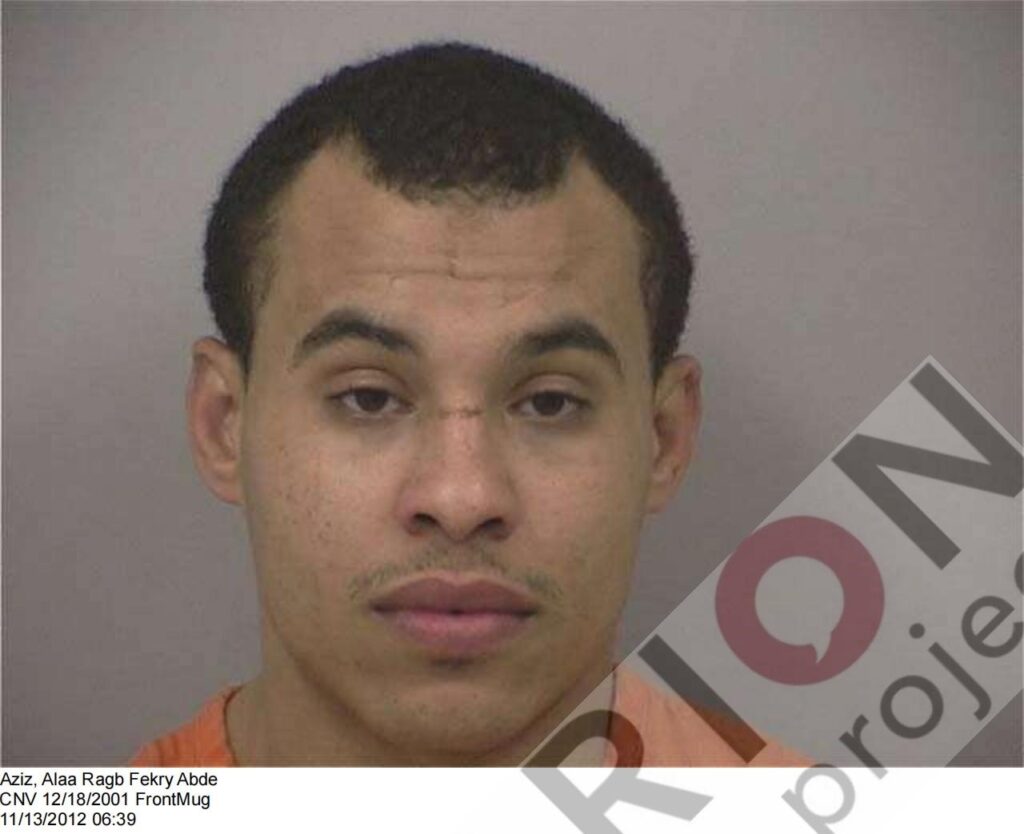The Colorado Springs Police Department documents show that an arrest warrant for Ali Abdelaziz was issued on August 10, 2011
He was arrested on December 18, 2001 after he re-entered the U.S. using the identity of Robert Earl Britton and hid as a fugitive.
Below is his booking photo:  According to the Bureau of Prisons, Alaa Ragb Abdel Aziz was housed at the Federal Correctional Institution Englewood in Littleton, Colorado from July 24, 2002 to April 30, 2003.
According to the Bureau of Prisons, Alaa Ragb Abdel Aziz was housed at the Federal Correctional Institution Englewood in Littleton, Colorado from July 24, 2002 to April 30, 2003.
Right after being arrested, he told the authorities that he is an Olympic champion in judo. He said that the Egyptian government federation was sponsoring his stay in the U.S. and that he had been training at the Olympic Training Center for about 5 years.
His excuse for engaging in identity fraud was that he needed a valid passport in order to visit his dying mother back in Egypt. That’s the same story he later told Mawyer.
However, when pressed by the investigators, he admitted that he needed to pose as a U.S. citizen so he could tenter two Judo competitions in Florida and Louisiana.
He also mentioned that he had taken a trip to Mexico, but nothing was said about the banned substances that were produced in Mexico and found in his possession.
Abdelaziz immediately began providing incriminating information about his accomplices. He offered to be an informant to help law enforcement prosecute other criminals.
The content of the documents suggest that Abdelaziz was trying to hide and downplay his connections to MOA. In fact, he is not quoted as mentioning anything about MOA at all.
When he talked about Zahir’s location in California, he vaguely said he was about an hour from Fresno, leaving out the fact that MOA’s “Baladullah” compound was located there.
While he tried to hide the MOA connection, he still quickly incriminated his closest associates.
He immediately told the authorities that Zahir had provided the identity documents to his cousin and Tuilethfuga.
He also confirmed that Zahir’s bank account was under the name of “Michael Marquez.” Later, when Zahir was prosecuted for drug trafficking, he was accused of using that same alias.
On December 27, 2001, a judge approved an arrest warrant for Ali Abdelaziz’s then-wife for False Reporting to the Authorities and Accessory to a Crime.
The story that Abdelaziz gave Mawyer differs from the story told by the official documents.
Abdelaziz told Mawyer he was “ratted out” by an associate who went to the U.S. Attorney’s Office, leading to his arrest at an airport for having a false passport.
Winfred Parchment
When INS agents searched Abdelaziz’s residence, they saw a birth certificate for a man named Winfred Parchment. The agents remembered that Parchment had been arrested on an immigration-related offense and that he was suspected of involvement in cocaine trafficking.
After his arrest, Abdelaziz immediately snitched on Parchment, telling the authorities that he was selling drugs. He offered to become an informant and make purchases from him. He said that his apartment was being regularly visited by marijuana and cocaine dealers, as well as suspicious people involved in a nearby car detailing business named “The Hispanic Touch.”
On December 20, 2001, the police searched the home where Parchment and others lived.
They found drug paraphernalia, various identity documents, two boxes of .40 caliber bullets, one box of .45 caliber bullets and a pistol in a box with hollow point, 9mm bullets. The firearm and ammunition were not seized because none of the residents were convicted felons, so their possession was legal.
Charged & Tried
Court documents show that Ali Abdelaziz was charged with 3 counts of forgery of a government-issued document; 2 counts of criminal impersonation; 2 counts of theft; 1 count of illegal possession of a controlled substance; 1 count of criminal possession of a financial transaction device and 1 count of unauthorized use of a financial transaction device.
Ali Abdelaziz told Mawyer he was in county jail in Colorado for about a year. The court documents do show that he was held for about a year while he was going through the various hearings and trial. Nothing in the documents indicate he posted bail so he could leave.
As he tells it, he was then found “not guilty” because the jury agreed with his lawyer’s “choice of evil” argument. The defense argued that he had no reasonable choice but to break the law by getting a false passport so he could see his ailing mother in Egypt.
Abdelaziz claimed that his girlfriend came with him to Egypt to get his mother’s death certificate and medical records in order to prove that he needed to stay in America so he could work and pay for her treatment.
The court documents show that he claimed he was being persecuted for his “Arab-Muslim heritage.”
He repeated the line when talking to a Colorado newspaper in 2004, where he admitted having been repeatedly detained after the 9/11 terrorist attacks. He said it was because he’s a Muslim and has dark skin.
Abdelaziz told Mawyer that he was arrested again months later and “they charged me with the same exact thing,” meaning it was double jeopardy and therefore unconstitutional.
The court records tell a different story.
His case was closed on August 15, 2002, when he was found not guilty on all counts. The Deputy District Attorney dropped the charge for illegal possession of a controlled substance.
However, there were additional charges for the same kind of crime. He wasn’t prosecuted for the same charge, as he claimed.
The chronology in the documents state that a jury trial began right after on August 16, 2002.
There were various continuances and vacating of the sentencing hearings between August and November 2002, which may be due to the parties negotiating a deal for Abdelaziz to become a Confidential Informant in exchange for being released and not deported back to Egypt.
A sentencing hearing finally took place on April 7, 2003. The session was closed because it involved national security and the judge had the transcript sealed.
He was sentenced for one count of criminal impersonation to gain a benefit, and one count of criminal possession of a financial transaction device.
His sentence consisted of only 60 days in jail and 90 days of unsupervised probation. However, he was given credit for being held for 206 days and ended up serving no additional jail time. He was then returned to federal custody by order of the court.

